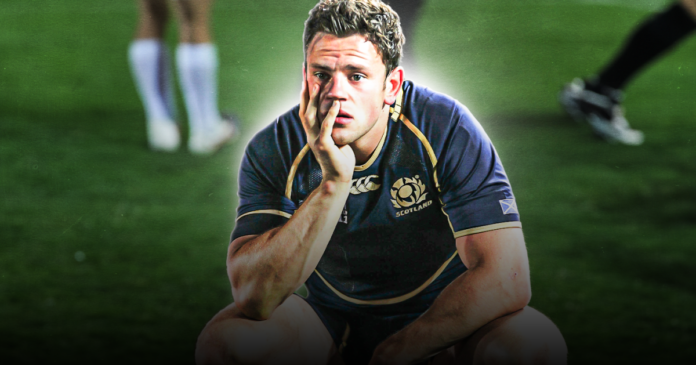
[ad_1]
Nick De Luca couldn’t understand why everyone seemed so glum. This was a Wasps squad thundering to the 2017 Premiership final, propelled by a cast of A-listers from across the rugby-playing globe. Willie le Roux and Kurtley Beale darted around the backfield. Nathan Hughes, James Haskell and Joe Launchbury rattled cages in the tight. Jimmy Gopperth and Elliot Daly pulled the strings and gobbled up the points. Wasps were top of the table for much of the campaign, yet De Luca says the place felt mired in malaise. In the final season of a tumultuous professional career, the Scotland centre went looking for answers.
“There were times when we had been miserable when I’d played for Edinburgh, a lot of that stemmed from us not being very good,” he says. “Why were we miserable here? We are smashing it, but everyone is so negative, what’s going on?
“I decided to do something about it and brought in John Ireland, an expert in emotional intelligence. He ran a few workshops on emotions and then a follow-up on those voices in our heads, how to accept and understand them, and importantly know what to do with them.
Jimmy Gopperth in action for Provence in the ProD2, where he is still playing at the age of 41 (Photo by Johnny Fidelin/Icon Sport via Getty Images)
“Jimmy Gopperth was one of the only people who didn’t sign up for those workshops. He said, and I paraphrase, ‘I’ve been doing this stuff for years, Nick, we are way ahead of the game in New Zealand’. Wow, no wonder I see him reading situations on the pitch and still playing in France smashing it aged 41, because mentally he is so robust, not just a wonderful player.”
De Luca has long been invested in mental health. He toiled to shake his own demons during a 43-cap career riven with self-doubt, blame and anxiety. High-profile errors led to damning judgements and cloying worry. He once played a Test match without so much as a wink of sleep the night before. At the height of things, he deleted his Twitter account because the bile and the discourse grew too uncomfortable to bear. De Luca was not the only Scotland player of this vintage to do so.
When he retired seven years ago, De Luca qualified as a mental health first aid instructor and went into coaching. He was appointed director of rugby at the prestigious Uppingham School, completed an MBA and through the Oakwood Training company, would later deliver mental health packages to operations as vast as the Williams Formula 1 team and the Barnardo’s charity. He returned north last summer, keen to harness his expertise for the betterment of young Scottish players.
There are a lot of conversations around mental health which is fantastic, but is anything actually changing?
De Luca is director of sport and activities at Merchiston Castle School, the Edinburgh rugby talent factory which has a pedigree in rearing international players over many decades. The glittering alumni roster features Norman Mair, Roger Baird, Fraser Brown, Zach Mercer and Jamie Dobie.
Working alongside the school’s director of rugby Roddy Deans, the respected youth coach and son of iconic Scotland and Lions captain Colin, De Luca is launching a set of rugby coaching camps with a difference.
The pair have called their programme ‘Totum’ – the Latin word for ‘all’ or ‘the whole’ – and are packaging their plan as a more holistic alternative to standard rugby clinics. They aim to help young players improve their technical skills, but just as importantly, handle mental strife and challenges away from the game.
“There are a lot of conversations around mental health which is fantastic, but is anything actually changing?” De Luca says. “Are the outcomes more positive? The statistics would say no, we are suffering more than ever. A big part of these camps and our work will be giving people strategies to leave with.
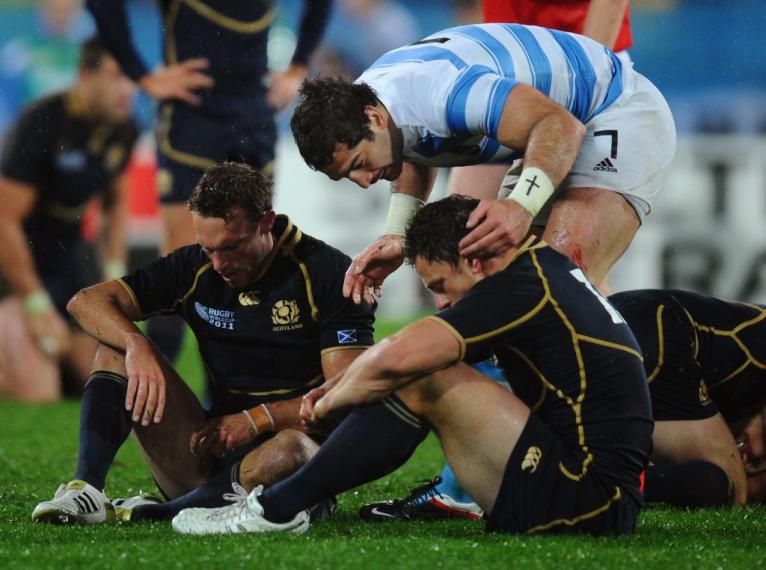 De Luca says he was “shamed” after making mistakes in a Scotland jersey (Photo by Stu Forster/Getty Images)
De Luca says he was “shamed” after making mistakes in a Scotland jersey (Photo by Stu Forster/Getty Images)
“As parents and coaches, we often see it as our job to take stress away from people as opposed to increase their capacity to cope with stress. Life is stressful! There is no getting away from it, so we need to give people the ability to cope with it, allowing them to grow.
“From my perspective having come through the system, arguably been ‘broken’ by the system, and rebuilt myself through the system, rugby will be our vehicle but it’s not the outcome. We are going to use rugby to teach people to be happy, healthy and then high-performing.
“With the skills we want to share, we hope they can reach their Everest, their Olympic medal. They’re not necessarily going to be professional, but are hope is that they will know how to get the best out of themselves, regardless of their path.”
I do feel there is a focus on winning too early over development and just letting the kids play. Do we really need to be keeping score and handing out medals to kids who are eight, nine and 10 years old?
Deans had a fine club career in his own right, before coaching Scotland Under-16s and U18s, as well as hometown club Hawick and Edinburgh powerhouse Heriot’s.
“It’s not just about the guys at the top level or the best players, we want to help every kid improve, whether it’s a simple skill development or getting into an A team or knowing how to become more resilient when dealing with setbacks,” he says. “We feel the combination of Nick and myself will allow players to maximise their potential to move forward in their rugby journey.
“I am also now coaching on the mini rugby circuit in the Borders where my young boy is playing , so I am seeing rugby from the very grassroots all the way to the top end of the game.
“There is lots of talent and many volunteers giving up their time. We all have a duty of care to protect our game, and I do feel there is a focus on winning too early over development and just letting the kids play. Do we really need to be keeping score and handing out medals to kids who are eight, nine and 10 years old?
“Nick and I have daily discussions on how we can develop better environments for learning. We also plan to use Totum as a vehicle to help support rugby clubs with coach education, how to develop a rugby curriculum and probably the most important aspect of helping support parents with children playing sport.”
De Luca cites numerous blows from a career which spanned almost a decade at Edinburgh and two years with Biarritz before his Coventry swansong. The yellow cards against New Zealand and Wales. Misplaced passes and spurned overlaps. A gnawing perception that while he could dazzle in Edinburgh’s midfield, De Luca was psychologically incapable of taking that obvious class to the international stage.
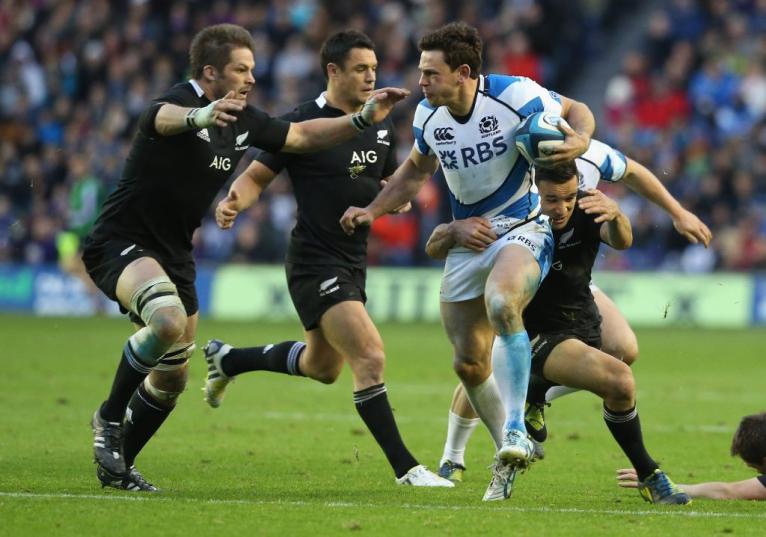 De Luca played in Scotland, France and England during a long club career, winning 43 caps for his country (Photo by David Rogers/Getty Images)
De Luca played in Scotland, France and England during a long club career, winning 43 caps for his country (Photo by David Rogers/Getty Images)
He is at pains not to portray himself as a victim, but rather an ambitious young athlete who, like many of his counterparts, lacked the tools and readiness to thrive in the maelstrom. Rugby, he says, defined him. And that was a mistake.
“My whole self-worth was reliant on how I performed. It got quite dark. It got to the point where if I made a mistake, I started questioning if I was lovable, even worthy of being a human.
“I stumbled across a way of figuring it out myself. What can I control? I can control who I am and what made me tick, what made me happy. It’s something I do with students – they have to define who they are, what they stand for and the behaviours behind that – their own scoreboard for success. My values were as simple as being brave, honest, and the ultimate professional so at the end of the day, could I answer those questions? If I’d done those things, I was absolutely fine.
“I remember getting one yellow card and for three or four days going missing. You couldn’t even speak to me. I was spiralling, couldn’t get out of it. It was relatively normal for people to behave like that when I was coming through the system.
It felt like I had more column inches than David Beckham the weeks before my debut. ‘The great white hope’.
“Four or five weeks later, having gone through and created my scoreboard, I then got another yellow card. Life gives you what you need, not what you want! That night I went through my questions, realised I’d done everything within my power, ticked my boxes, and was able to go out that night with some friends and went to bed and slept well. I didn’t lie there beating myself up and questioning my self-worth. We need to build that capacity to cope with stress – mindset, support and social networks, self-regulation and mental rehearsal alongside other things.”
When he made these errors, De Luca frequently lashed out. He hauled the negativity around like a yoke with predictable impact on his performance. He remembers his debut against France back in 2008, a time when Scotland existed in the rugby doldrums, seemed less prolific than the San Marino football team, and needed a new hero to emerge from the ranks.
“My first few caps didn’t go as I wanted. It felt like I had more column inches than David Beckham the weeks before my debut. ‘The great white hope’. I played, probably, fine against France. I’ve never watched it back. It felt relatively bad. In those moments, I found it easier to blame others, to protect my ego and self-worth. Never publicly, but privately it was my coping strategy, one that denied me ownership, denied me growth.
“After my mistakes I was shamed, and carrying that fear and guilt forward, it just stacks up. I couldn’t take feedback and I certainly wasn’t going to put it under the lens myself. It was much easier to blame others.
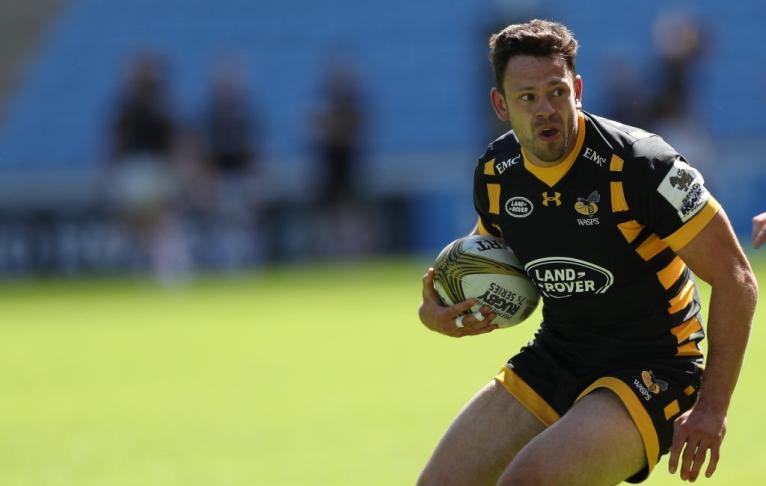 De Luca spent the final season of his career with Wasps, retiring in the summer of 2017 (Photo by Lynne Cameron/Getty Images)
De Luca spent the final season of his career with Wasps, retiring in the summer of 2017 (Photo by Lynne Cameron/Getty Images)
“By having radical accountability, I could shape my future and change my outcome. For two or three years in the Scotland team, I just hid and hoped it would get better as opposed to saying, this is what you’re about, you need to take it by the scruff and go and sort it.
“We want to help kids understand where they’re going, who they are, and how to get there – and if they don’t make it, here are some strategies to help you learn, grow and still smash things wherever you go. We can use rugby as a vehicle to test and create character, and allow you to succeed wherever you go.”
In his days leading Scotland’s age-grade teams, Deans often agonised over which prodigious youngster to select and saw the devastation in those who had not made the cut. He talks a lot about Stafford McDowall, the towering Glasgow centre who was stuck on the periphery for an age before burning to the fore under Franco Smith, and winning his first Scotland caps. McDowall had been passed over for Scottish youth selection and was low in confidence when he came to Merchiston. A few years later, he captained the national U20s.
No wonder his confidence was broken as a young man, every session he would ask us, ‘what do I need to do?’
“A lot of boys who don’t make those initial Scottish squads, definitely don’t have the capacity themselves to sit down and plan a way to make it,” Deans says.
“Stafford being the prime example. People would be very quick to point out his weaknesses rather than looking at his full potential. I often find people tend to go negative first with young players – we need to flip this.
“No wonder his confidence was broken as a young man, every session he would ask us, ‘what do I need to do?’ We were consistent with our message: keep your head down, work hard and stick to the process. If you are good enough, your talent will take you to the top.
“I do firmly believe his early disappointments of not making age-grade squads gave him the required tools to become resilient and overcome the setbacks. Watching him step past Bundee Aki against Ireland this year made us all very happy.
“This links into another key aspect of why we are developing Totum, to support players like Stafford. It didn’t take me long to see natural ability when coaching Stuart Hogg, Zach Mercer, Jamie Dobie and Cam Redpath. These boys were always going to make it. We feel with our experiences, we can tap in to and really help the group of players below the elite to develop their game.”
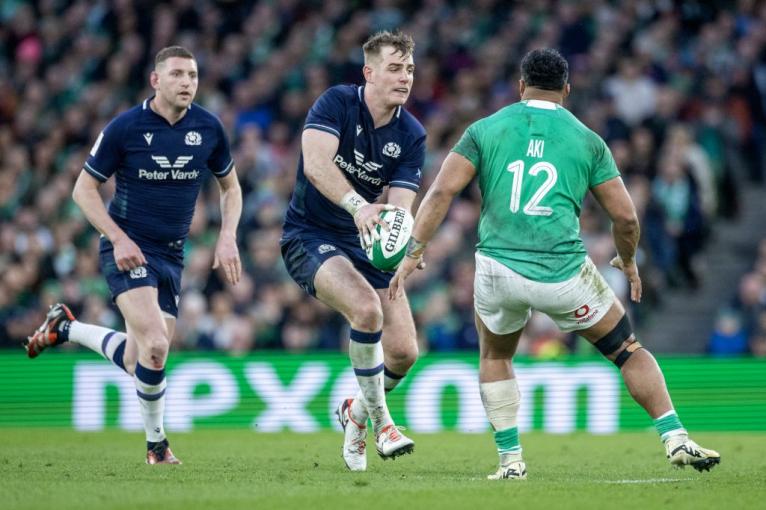 Stafford McDowall lined up opposite Bundee Aki for his first Scotland cap against Ireland during the Six Nations (Photo by Tim Clayton/Corbis via Getty Images)
Stafford McDowall lined up opposite Bundee Aki for his first Scotland cap against Ireland during the Six Nations (Photo by Tim Clayton/Corbis via Getty Images)
Education on diet and the advantages and dangers of social media will also be offered. So, vitally, will tuition on the elements of a collision sport which have alarmed so many parents.
“We are dealing with worried parents every day” Deans says. “That’s where Nick and I, through our experiences, can bring real expertise of making the game safe, particularly within our coaching methods or just technically knowing how to break down a skill and build it back up safely.
“My boy has just started tackling, he’s coping fine with it but there are kids out there finding the transition difficult and look quite scared. I can now see the safety problems first-hand and understand why parents may be reluctant to let kids play. We hope when young kids leave our Totum camps, they will be more confident and contact-safe to deal with the modern game.”
The first Totum camps are scheduled for the 2025 Easter and summer holidays, and are due to be held at Peebles Rugby Club and Merchiston itself. There are numerous such initiatives out there, some run by Scottish Rugby, and some independently by other ex-internationals and passionate coaches. De Luca and Deans believe theirs can leave a lasting footprint.
“I talk often about the starfish parable, where there’s been a big storm in the night and there are thousands of starfish washed up all over the beach the next day,” De Luca says. “An old man walks the beach and sees a a boy throwing them back in the ocean. He says, ‘What are you doing? You’re not going to make a difference.’ And the boy replies, ‘yeah, but I’ll make a difference to this one starfish.’
“We don’t know if we’ll get five kids, 20 kids, 100 kids. But we want to make a difference where we can, use our skillsets and not just hold on to them for the elite. Not everyone can go to school at Merchiston. The camps are a way of widening our reach. We want more milk then we’ll have more cream for Scottish rugby. And if we can make a positive difference to a couple of people’s lives along the way, that would be awesome.”
[ad_2]
Copyright for syndicated content belongs to the linked Source link

